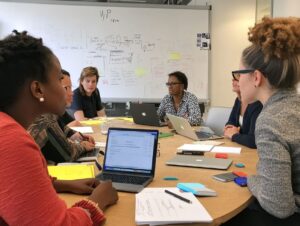In an ever-evolving job market, the skills developed today are crucial for navigating the challenges of tomorrow.
As technology advances and workplace dynamics shift, attributes such as adaptability, critical thinking, emotional intelligence, and effective communication are increasingly essential for achieving success.
This article will explore the top skills required to thrive in the future, along with practical strategies for cultivating them.
Additionally, it will examine in-demand industries and strategies for future-proofing one’s career, thereby ensuring preparedness for whatever may lie ahead.
Why are Future Skills Important?

Future skills are crucial for effectively navigating an increasingly complex and dynamic world, where rapid technological advancements and evolving job markets require a workforce equipped with essential competencies.
As societies prioritize digital literacy, emotional intelligence, and adaptability, the demand for individuals capable of critical thinking and effective problem-solving continues to grow.
These skills not only prepare individuals for the challenges of the contemporary workplace but also promote resilience and lifelong learning, ensuring their ability to thrive in environments marked by constant change and uncertainty.
Top Skills for the Future
As we enter an era characterized by rapid technological advancement, the foremost skills for the future encompass a wide range of competencies designed to promote success in both personal and professional domains.
Central to these skills is adaptability, which enables individuals to effectively navigate change. Additionally, emotional intelligence plays a critical role in cultivating strong relationships and fostering teamwork.
Creativity, problem-solving, and collaboration are also essential skills, further supported by effective communication abilities that enhance interpersonal interactions in an increasingly digital landscape.
Adaptability and Flexibility
Adaptability and flexibility are increasingly recognized as essential competencies in a dynamic environment where change is the only constant. These skills enable individuals to respond effectively to new challenges and opportunities, rendering them invaluable in today’s fast-paced work settings. As industries undergo transformations driven by technological advancements, those who demonstrate resilience and adaptability are better positioned to succeed and excel in their roles.
In both personal and professional contexts, fostering adaptability often involves embracing continuous learning and remaining open to feedback. For example, an employee may enhance their skill set through online courses or workshops, enabling them to navigate new software or methodologies with proficiency.
Similarly, the ability to adjust flexibly to changes in team dynamics or company direction can promote a more harmonious and productive workplace.
In sectors such as healthcare and technology, effective change management is paramount; individuals capable of swiftly pivoting in response to new regulations or innovations not only alleviate stress but also lead their teams confidently through periods of uncertainty. Consequently, the ability to embrace change not only enriches individual careers but also bolsters organizational resilience.
Critical Thinking and Problem Solving
Critical thinking and problem-solving are essential competencies that enable individuals to analyze complex situations, make informed decisions, and develop innovative solutions. In a constantly evolving work environment, these skills enable professionals to navigate challenges with confidence, thereby ensuring their effective contribution to team objectives.
By refining their analytical abilities and employing strategic thinking, individuals can enhance their problem-solving skills and drive meaningful change within their organizations.
These qualities are crucial not only in fields such as healthcare, where rapid assessments can be life-saving, but also in business, where market dynamics require swift and strategic responses.
To cultivate these skills, individuals may engage in analytical exercises, such as puzzles and simulations, which foster creative thinking and adaptability. Additionally, exploring diverse case studies facilitates the application of theoretical knowledge to real-world problems, thereby reinforcing decision-making capabilities.
This structured approach to enhancing critical thinking will ultimately result in more effective solutions across various professional environments, making it a vital focus for anyone aspiring to excel in their career.
Emotional Intelligence

Emotional intelligence (EI) is defined as the capacity to comprehend and regulate one’s own emotions while simultaneously recognizing and influencing the emotions of others. This competency is essential for promoting effective collaboration and communication within teams. By cultivating empathy and social intelligence, individuals can effectively navigate interpersonal dynamics, strengthen relationships, and foster a positive workplace culture that enhances overall performance.
The development of emotional intelligence encompasses a combination of training, practice, and self-reflection. For example, participation in workshops that focus on active listening can assist team members in becoming more attuned to their colleagues’ emotions, thereby facilitating improved conflict resolution and team cohesion.
Likewise, leaders who engage in self-awareness exercises can enhance their ability to motivate and inspire their teams. Consequently, organizations that prioritize the development of emotional intelligence frequently observe improvements in teamwork and productivity, as employees feel more valued and understood. This, in turn, drives better outcomes for both individuals and the organization as a whole.
Collaboration and Communication
Collaboration and communication represent essential competencies that facilitate successful interactions within today’s diverse and interconnected workplace. Effective teamwork is predicated on clear communication, which fosters a sense of unity and purpose among team members.
As remote work becomes increasingly prevalent, it is imperative to refine virtual communication skills and develop cross-cultural competence to ensure productive collaboration across geographical and cultural boundaries.
These dynamics are vital, whether in a virtual meeting or a traditional office setting, as misunderstandings can easily occur when team members are not physically present. One effective strategy is the utilization of collaborative tools, such as video conferencing software, which facilitates real-time interaction, enhances engagement, and minimizes the potential for miscommunication.
Creating an environment that prioritizes cultural awareness encourages team members to share their perspectives and experiences, thereby leading to more inclusive decision-making processes. Additionally, training sessions focused on effective listening and non-verbal cues can enable individuals to navigate the complexities of diverse work cultures, ultimately enhancing the overall quality of teamwork.
Technology and Digital Literacy
Technology and digital literacy are essential competencies that enable individuals to succeed in an increasingly digital landscape. With the proliferation of remote work and online collaboration tools, possessing strong technological proficiency has become crucial for effective communication and productivity.
A solid understanding of cybersecurity and the fundamentals of e-learning is vital for safeguarding both personal and organizational data while navigating online environments.
The ability to effectively utilize digital tools not only enhances an individual’s employability but also promotes innovation and adaptability across various industries. As organizations continue to evolve, they actively seek candidates capable of seamlessly integrating technology into their workflows.
Continuous education in these areas is of utmost importance; there are numerous online courses and certification programs available through platforms such as Coursera, LinkedIn Learning, and edX.
These resources enable individuals to stay abreast of technological advancements and refine their skills, thereby ensuring their competitiveness in the job market.
How to Develop Future Skills
The development of future skills is crucial for both personal and professional growth, and individuals can utilize various strategies to enhance these competencies.
Engaging in lifelong learning, as well as seeking mentorship or coaching, can offer valuable insights and guidance as one progresses in their career.
Additionally, adopting a self-directed learning approach enables individuals to take control of their development by exploring resources and opportunities that align with their goals.
Practical Ways to Improve

There are several effective strategies for enhancing skills and adapting to the evolving demands of the future job market. Engaging in lifelong learning through courses, workshops, and seminars can significantly expand one’s knowledge base and competencies.
Utilizing feedback mechanisms and conducting skill gap analyses can provide valuable insights into areas that require improvement, while coaching offers personalized guidance for professional development.
Exploring online platforms such as Coursera, Udemy, or LinkedIn Learning enables individuals to access a diverse array of courses tailored to various interests and industries. Networking opportunities, whether virtual or in-person, serve as essential channels for exchanging ideas and gaining insights from industry professionals.
Participating in local meetups or joining professional organizations can further enhance one’s understanding of current trends. By fostering a culture of continuous assessment and actively seeking constructive criticism, individuals can significantly improve their adaptability and overall proficiency in an increasingly competitive landscape.
Preparing for the Future Job Market
Preparing for the future job market necessitates a comprehensive understanding of the skills and competencies that will be in demand across various industries.
As technology continues to evolve, sectors such as data analysis, artificial intelligence, and digital marketing are becoming increasingly vital for growth. Additionally, cultivating an entrepreneurial spirit and developing project management skills significantly enhances one’s business acumen, thereby making individuals more adaptable and competitive in the evolving job landscape.
In-Demand Industries and Careers
In-demand industries are undergoing rapid transformation, with sectors such as artificial intelligence, digital marketing, and cloud computing taking the lead in generating new career opportunities. As these fields continue to expand, the demand for skilled professionals with expertise in technology, data analysis, and user experience design has reached unprecedented levels.
Individuals aspiring to enter the job market must prioritize the acquisition of skills that will be highly valued by employers in these emerging sectors.
For example, companies such as Google and Amazon are at the forefront of innovations in artificial intelligence and are actively seeking data scientists who possess strong programming capabilities and a comprehensive understanding of machine learning algorithms.
Similarly, organizations like Shopify and HubSpot highlight the increasing significance of digital marketing, actively recruiting creative individuals proficient in SEO and content strategy. In the field of cloud computing, industry leaders such as Microsoft and IBM emphasize the importance of professionals with expertise in cybersecurity and cloud architecture.
To excel in these domains, candidates must not only possess technical skills but also demonstrate adaptability, as the technological landscape is constantly evolving and necessitates a commitment to lifelong learning.
Future-Proofing Your Career
Future-proofing one’s career necessitates the implementation of proactive strategies designed to ensure long-term professional success in an increasingly dynamic job market. The development of resilience and a commitment to lifelong learning enables individuals to adapt to change and capitalize on emerging opportunities.
Effective networking is integral to career advancement, as it provides access to innovative ideas, valuable resources, and potential mentors who can facilitate professional growth.
To cultivate these essential skills, individuals are encouraged to pursue training programs, attend workshops, and participate in communities that emphasize professional development. Embracing emerging technologies and industry trends is vital, as it facilitates the acquisition of pertinent knowledge that enhances employability.
Maintaining a robust professional network can create opportunities for collaboration and the exchange of best practices, which is crucial for adapting to industry shifts. By fostering a mindset of curiosity and flexibility, professionals position themselves not only to navigate challenges but also to thrive in the face of adversity, ultimately ensuring that their career trajectories remain both dynamic and fulfilling.
Frequently Asked Questions

What are some essential skills needed for the future?
Some essential skills needed for the future include adaptability, critical thinking, problem-solving, digital literacy, communication, and creativity.
How can I improve my adaptability skills?
You can improve your adaptability skills by embracing change, being open to learning new things, and being flexible in your approach to tasks and problems.
Why is digital literacy important for the future?
Digital literacy is important for the future because technology is constantly evolving and being able to use and understand digital tools and platforms will be crucial in many industries and jobs.
What does it mean to have good communication skills?
Having good communication skills means being able to effectively convey information and ideas to others, listen actively, and adapt your communication style to different situations and audiences.
In what ways can I develop my creativity?
You can develop your creativity by practicing brainstorming, trying new things, stepping out of your comfort zone, and being open to new perspectives and ideas.
How can I become a better problem-solver?
To become a better problem-solver, you can practice breaking down problems into smaller parts, considering different solutions, and thinking critically and creatively to find the best solution.




